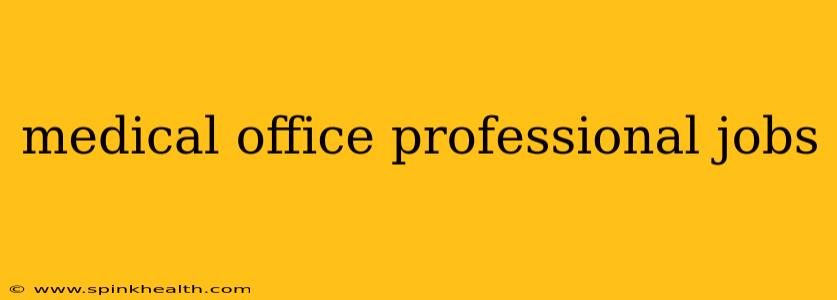Charting a Course: Exploring the Diverse World of Medical Office Professional Jobs
The world of healthcare is vast and complex, but behind every doctor, nurse, and specialist is a dedicated team of medical office professionals keeping everything running smoothly. These individuals are the unsung heroes, the logistical masterminds, and the compassionate caregivers who ensure patients receive the best possible care. If you're considering a career in this dynamic field, let's explore the diverse landscape of medical office professional jobs and uncover the rewarding opportunities that await.
My name is Sarah, and I've spent the last 15 years working in various roles within medical offices, from a small family practice to a bustling multi-specialty clinic. I've seen firsthand the impact these professionals have on both patients and the healthcare system as a whole. This experience fuels my passion for sharing knowledge and helping others discover the perfect career path within this rewarding sector.
What are the different types of medical office professional jobs?
This is a question I get asked frequently. The answer is: it depends! The roles available vary greatly depending on the size and type of medical practice. However, some common roles include:
-
Medical Assistant: Medical assistants are often the first point of contact for patients. Their duties can include taking vital signs, assisting with examinations, administering medications (under supervision), and recording patient information. They're often the glue that holds the office together, juggling multiple tasks simultaneously.
-
Medical Secretary/Administrative Assistant: These roles focus on the administrative side of the practice. They schedule appointments, answer phones, manage patient records (both paper and electronic), handle billing and insurance claims, and generally keep the office organized and efficient. Think of them as the office managers, ensuring everything runs smoothly behind the scenes.
-
Receptionist: While often overlapping with administrative assistant roles, receptionists primarily focus on greeting patients, answering phones, scheduling appointments, and handling initial patient inquiries. Their warm and welcoming demeanor sets the tone for the patient's visit.
-
Medical Coder/Biller: These professionals are crucial for the financial health of a practice. They translate medical diagnoses and procedures into codes for insurance billing, ensuring accurate reimbursement from insurance companies. Their attention to detail and understanding of complex billing regulations are vital.
-
Medical Records Technician: These individuals are responsible for the organization, maintenance, and security of patient medical records, both physical and electronic. They ensure compliance with privacy regulations (like HIPAA) and make sure that information is readily accessible when needed.
What skills are needed for medical office professional jobs?
Success in these roles requires a blend of hard and soft skills. Let's break it down:
-
Hard Skills: Proficiency in medical terminology, electronic health records (EHR) software, medical billing and coding (for specific roles), and typing skills are crucial. Strong organizational skills and attention to detail are also essential, particularly for tasks involving patient records and insurance claims.
-
Soft Skills: Excellent communication skills are paramount, as these professionals interact with patients, doctors, and insurance companies daily. Strong interpersonal skills, empathy, and the ability to handle stressful situations calmly are also vital. Teamwork and the ability to multitask are crucial for success in fast-paced medical settings.
What education or training is required for medical office professional jobs?
The educational requirements vary depending on the specific role. Some positions, like receptionists, may only require a high school diploma and on-the-job training. However, others, like medical assistants and medical coders, typically require formal education or certification programs. Many community colleges and vocational schools offer relevant programs that can provide you with the necessary skills and credentials.
What is the job outlook for medical office professional jobs?
The job outlook for medical office professionals is generally positive. The aging population and increasing demand for healthcare services are driving growth in this sector. The Bureau of Labor Statistics projects substantial job growth for many of these roles in the coming years.
How can I find a medical office professional job?
Numerous avenues exist to find these jobs. Online job boards (like Indeed, LinkedIn, and Monster) are great starting points. Networking within your community, attending healthcare career fairs, and directly contacting medical practices are also effective strategies. Tailoring your resume and cover letter to the specific requirements of each position is crucial for maximizing your chances of success.
The world of medical office professional jobs is full of opportunity, offering a blend of challenge, reward, and the satisfaction of contributing to the wellbeing of others. With the right skills and dedication, a fulfilling career awaits. Remember to research specific roles to understand their requirements and find the perfect fit for your interests and talents.

